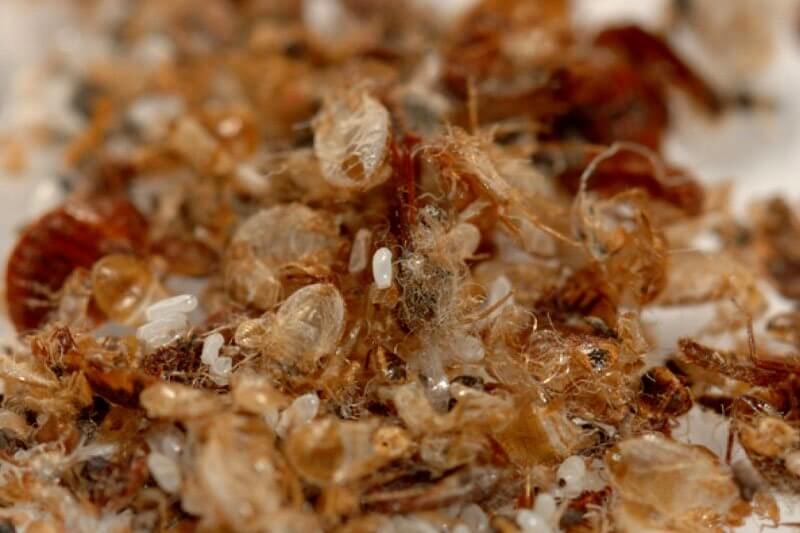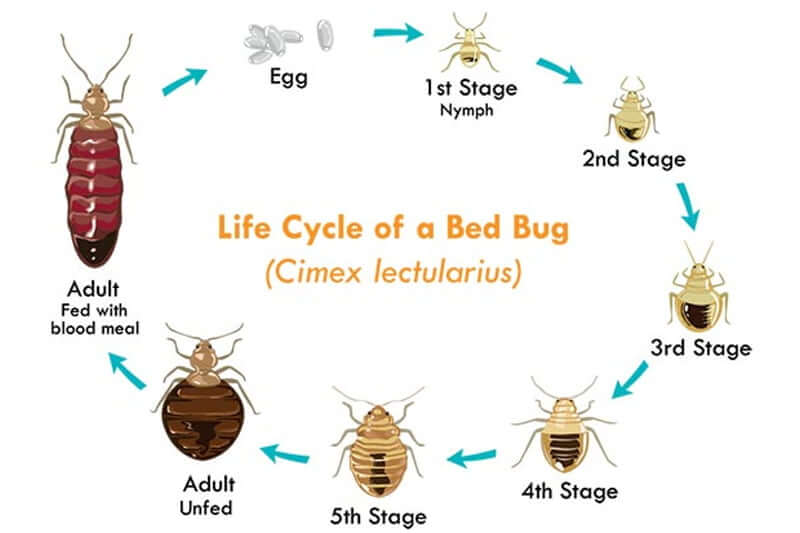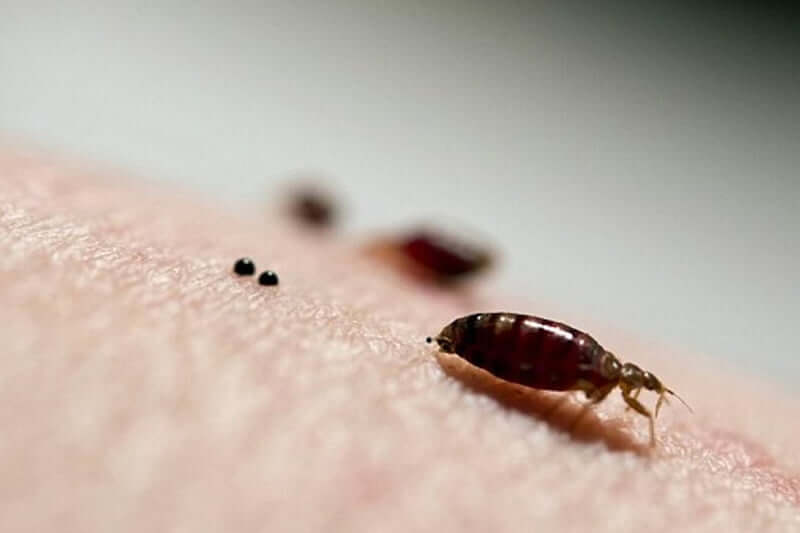Spotting bed bugs in your home, even if it’s just one, is always a big reason for concern. These small biting monsters not only disrupt the peace in your house, but they can also bring a lot of shame if you’re hosting visitors.
The weird thing about them, however, is just how long they can live without a host. It’s reported that young bed bugs can survive for around 3 – 6 months without feeding, while an adult bed bug can live for up to a year without a meal.
This fact makes it one of the reasons why it’s very difficult to completely get rid of the bed bug. In this article, we’ll dive deeper into why and how these pests can live for such a long time without a host.

Bed bugs are one of the most resilient pests on the planet. Even without a host, these monsters can live for more than a year (400+ days) in a state of hibernation.
During this period, the bed bugs will shed at least a third of their weight allowing them to survive through extreme cold periods and heatwaves.
However, this survival mostly applies to adult bed bugs. Nymphs require at least one blood meal for them to develop into the next stage of their lifecycle. Female bed bugs also require a blood meal to be able to lay eggs.
Here’s a summary of this data:
| Bed bugs | Lifespan without host |
|---|---|
| Adult | 14 months or 400+ days |
| Nymph | 3 - 5 months |
| Female bed bug | First needs blood to lay eggs |
Factors that affect bed bug survival without food
There are numerous factors that determine how long a bed bug can survive without food. The three major ones include:
Age
The age of the bed bug is the most important factor that determines how long it can survive. Generally, the older the bed bug, the longer it can survive without taking a meal.
As earlier mentioned, adult bed bugs can last for up to 18 months without a meal under optimal temperature. Nymphs, on the other hand, can only last for up to 6 months.
Here’s a breakdown of the bed bug life cycle.

Habitat and activity level
How far a bed bug has to travel to reach its host will also be a factor in determining its lifespan. Bed Bugs that live closer to their host tend to survive longer without food compared to those that need to travel longer to find a host.
Temperature
The room temperature can not only kill bed bugs, but it also influences their feeding patterns. In the cold winter conditions, bed bugs tend to use less energy and thus, don’t need to feed as often.
But during the warm summer season, the bed bugs will utilize more energy, meaning they’ll need to feed more times to survive.
To put this into perspective, entomologists in 2009 discovered that at 80 degrees Fahrenheit, bed bugs in their nymph stage only survived for around a month without feeding. But when the temperature is increased to around 99 degrees Fahrenheit, the bugs can only survive for 17 days.
This showed that a 15-degree Fahrenheit increase in temperature can cause a decline of nearly 50% in the bed bug’s lifespan.
Where do bed bugs hide in an empty house?
Due to their ability to go without food for a long time, bed bugs can easily survive in an empty house long enough for a new host to move in.
Normally, you’ll find bed bugs hiding in your furniture, beds, mattresses, or other items scattered around the infested room. But for an empty house, the bed bugs get smarter.
They hide in the cracks or crevices on your walls, in wall sockets and other lighting fixtures, as well as behind loose trims and moldings.
Hardwood floors and loose floorboards could also be a key hide-out for bed bugs in an empty house.
We, therefore, recommend that you consult a professional bed bug exterminator to conduct a thorough inspection before moving into an empty house.
Do bed bugs only feed on human hosts?
No! While humans are their primary hosts, bed bugs can feed on nearly every warm-blooded mammal on the planet. The main reason they prefer human blood is because humans are easy hosts to target.
Without too much hairs and fur on their skin, the bed bug finds it easier to bite and draw blood from the human host, than it would from other furry animals like a dog or cat.
The tube/straw-shaped mouth of the bed bug also means that it can’t chew or bite other foods.
Can bed bugs eat anything other than blood?
No. bed bugs rely on blood and blood alone for their source of food and nutrients. They gain vitamins and proteins from it, which is essential for the development of baby bed bugs and their adolescents.
Their bodies are also great at preserving moisture, thanks to their waxy coats, which ensures that they don’t need to drink blood often.
In fact, it’s for this reason that adult bed bugs can survive for more than a year without having a blood meal.
Other myths that bed bugs feed on each other, on dead skin or hair, on food crumbs, or on other insects are completely false.

Can you starve bed bugs to death?
Yes! While it will take a long time to be effective, starving bed bugs is an effective alternative when fighting against these tiny pests. The most effective way to do this is using a mattress encasement.
The zipped case will trap the bed bugs in the mattress ensuring they can’t get out to bite you. This also prevents new bed bugs from hiding inside the mattress.
Nevertheless, for this starvation method to be effective, you’ll need to leave the case on for at least a year. But depending on the average room temperature, the bed bugs could die within two or three months.
During this period, the bed bugs will still keep mating in the first few weeks, and the female will lay eggs (assuming they recently had a blood meal). But after a while, they’ll need to feed to lay eggs, which will become impossible.
Alternatives to starve bed bugs
In cases where the bed bugs aren’t in your mattress, here are other ways you can starve the bed bugs:
- Vacate and seal up the infested room – Even though this isn’t the most ideal of options, choosing to sleep in a different room might be just what you need to starve the bugs. However, be careful not to transfer one or two bugs with you to a different room.
- Use traps – Most bed bug traps work by ensuring the bed bugs stick to them, leaving no room for the bugs to come and bite you.
- Sleep with more clothes – Bed Bugs love biting humans because we sleep leaving exposed skin areas e.g., hands, feet, ankles. By sleeping with more clothes on, you’ll make it much harder for the bed bugs to find a patch of skin to bite.
- Use bed bug repellants – You can also opt to spray several bed bug repellents that have permethrin and other pyrethroids around your bed. This will wade the bed bugs away, forcing them to starve.
How long can bed bugs survive in a sealed plastic bag?
If the bed bugs are on other items around the room, you can choose to starve them to death by placing them in sealed plastic bags. This way, the bed bugs are deprived of access to a source of food forcing them to starve and die eventually.
Under extreme cold (below 0 degrees Fahrenheit) or heat (above 120 degrees Fahrenheit), doing this will kill the bugs in 1 – 3 days.
But when left under regular temperature, bed bugs in a plastic bag will starve in around 5 months.
Will a plastic bag in the sun kill bed bugs?
Yes and no. Even though the heat generated inside the plastic bag will kill the bed bugs, it won’t eliminate all of them. According to the Environmental Protection Agency (EPA), any temperature higher than 80 degrees Fahrenheit will get rid of the bed bugs.
However, it will be very hard for you to pack all the infested items in your house in plastic bags to be heated by the sun. Additionally, you also can’t rely upon the sun’s heat to be 100% effective in killing the bed bugs.
Can bed bugs get out of a plastic bag?
Yes! If there’s any hole or tear in the plastic bag, the bed bugs will easily get out. If this happens to you, change the bag immediately for the process to be effective.
The good news, however, is that bed bugs don’t have teeth or a tongue to chew through the bag.
How long do you leave clothes in a bag to kill bed bugs?
After a trip where you suspect you might have carried some bed bug home, you’ll need to be more careful when unpacking. The best way to ensure that you eliminate all bed bugs is by washing all your clothes in hot water.
Once they’re clean, place them in the dryer under the highest temperature setting. If you do this, the bed bugs will be gone in just one day.
However, if the dryer isn’t an option, you’ll need to seal the bag and clothes in plastic bags and leave them under the sun. Depending on the age of the bed bugs, you may have to keep the clothes outside for a few weeks to three months.
How can you get rid of bed bugs?
While starving bed bugs to death can help you get rid of these irritating insects, it’s not always the most effective way to kill the bugs. Other ways you should try to get rid of bed bugs include:
Wash all your beddings
This should always be your first step when a bed bug infestation breaks out in your bedroom. Wash all your sheets, clothes, curtains, and other beddings using hot water, then dry them under the highest temperature setting.
If there’s anything that’s yet to be washed, place it in a sealed plastic bag to ensure no bug escapes.
Vacuum your bed and its surroundings
Besides washing your bedding, you should also vacuum your mattress and all areas around the bed. Vacuuming gets rid of all the bed bug eggs, shells, droppings, and any live bugs that could be left.
Don’t forget to first scrub the mattress with a soft-bristled brush to dislodge any bed bug eggs before vacuuming. Immediately you’re done, take out the vacuum bag and seal it then dispose of it in an outdoor trash can.
Use bed bug sprays
If after cleaning your bedding and vacuuming you still notice the bugs, using bed bug sprays could be your solution.
These sprays usually kill the bed bugs on contact and can be really useful in targeting bed bugs hiding in wall cracks, headframes, headboards, and other hidden spots.
Nevertheless, it’s possible that bed bugs could have developed resistance to some chemicals used in the sprays today. Therefore, always consult a professional pest control expert to help you determine the most effective bed bug spray to use.
FAQ's
No! On the contrary, bed bugs will thrive and grow their colony if you leave them alone. To get rid of them, contact an exterminator immediately.
Bed Bugs tend to die when exposed to temperatures above 120 degrees Fahrenheit for more than an hour. They also die instantly when exposed to temperatures above 140°F.
Traveling. Most homeowners pick up bed bugs when they sleep in motels and hotel rooms that are infested with the bugs. They might also pick them up when using public transport.
When left out in the open, bed bugs won’t live on your clothes for long. They’ll move around looking for a host. But when sealed in a bag, bed bugs can live for up to 4 months on clothes without a host.
Adult bed bugs on your furniture can live for more than a year without a host. This is why you should be wary of picking up any furniture you find disposed of on the street.











